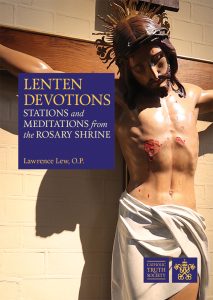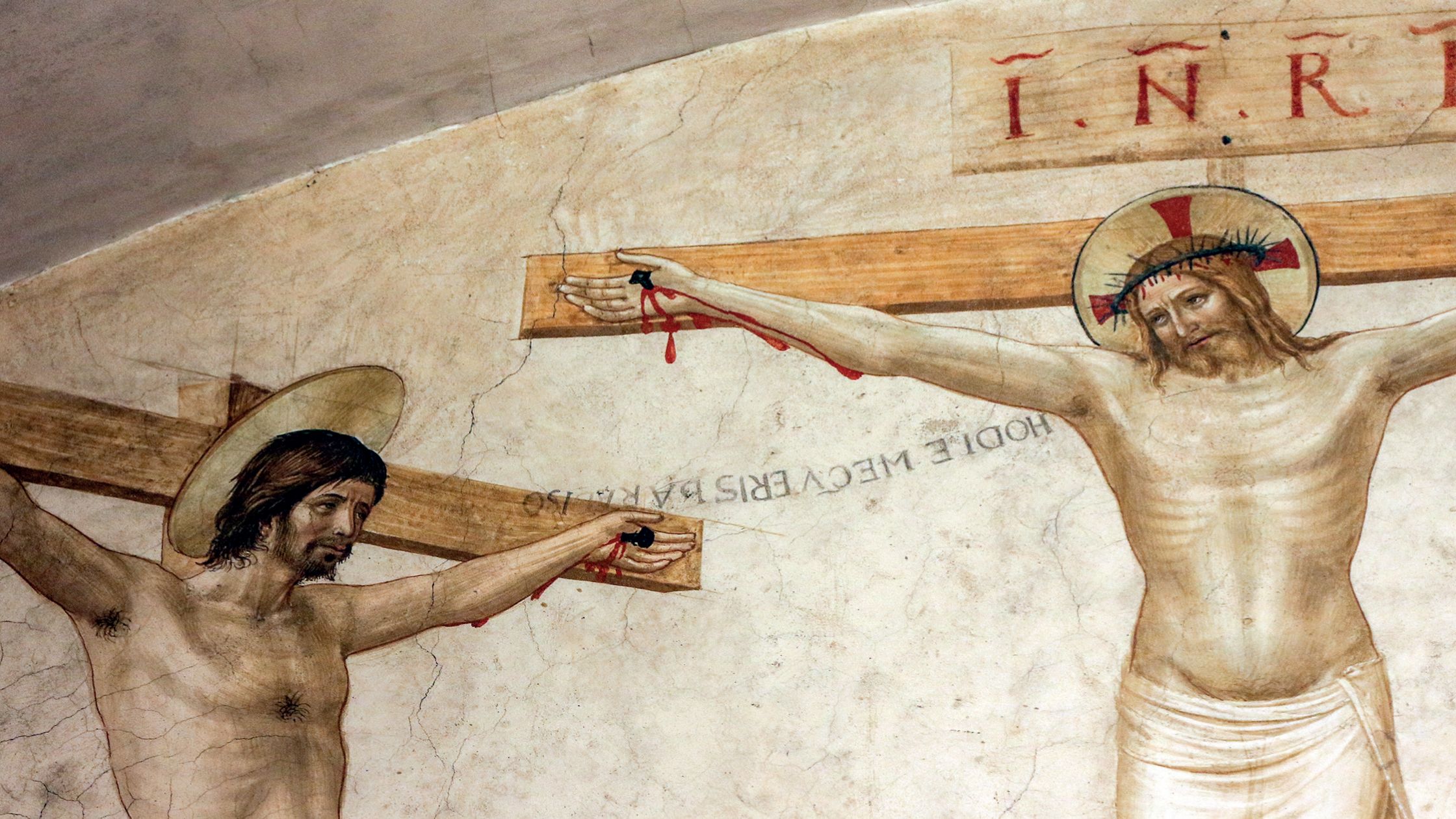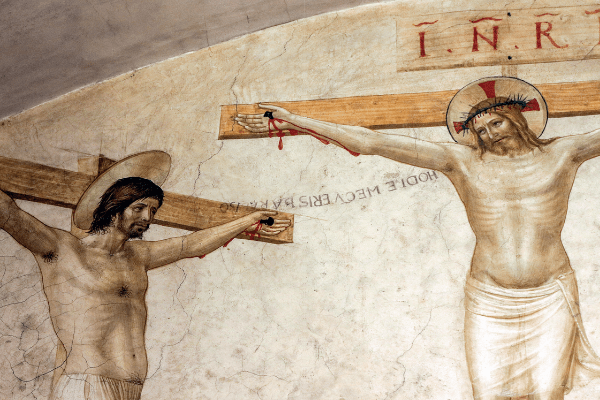The Seven Last Words of Our Lord have, from the sixteenth century, been the subject of meditations of Good Friday. Fr Lawrence Lew Op’s set of reflections, the first of which is presented here, was first preached in Holy Week of 2022, during the Rosary Shrine’s annual “Holy Week Retreat”.
The second word (see Lk 23:43):
To the “good thief ”:
Truly, I say to you, today you will be with me in Paradise.
As Christ’s first word, his first testament on the cross, is to the forgiveness that God offers to all of sinful humanity, so his second word and testimony on the cross is to particularise that forgiveness and to reveal the effect of personal repentance: it opens wide the doors of paradise. As such, Christ’s words to the good thief – Saint Dismas as he is traditionally called – show us how our lives can be changed and transformed in an instant, for the spiritual action of grace takes no time at all, if we open wide our hearts to God’s grace and mercy.
On most Sundays at Matins the Church prays a fourth-century hymn of thanksgiving, traditionally attributed to St Ambrose of Milan. In the central section of the hymn, we sing:
When you [Christ] became Man to set us free
you did not shun the Virgin’s womb.
You overcame the sting of death
and opened the kingdom of heaven to all believers.
The first believer to whom Christ opens the kingdom of heaven is the one who says to him: “Jesus, remember me when you come into your kingdom.” With these words, Dismas shows himself to be a believer: he believes that Jesus is king; that he will reign forever in a kingdom that is not of this world. Above all, he believes that Jesus will be true to his name and save him. The holy name Jesus, which the good thief calls out in prayer, means “God is my salvation”. To call on the name of Jesus, therefore, is to believe in the power of God to save us through him; it is to believe in the power of Christ’s advocacy. Hence the Lord taught in St John’s Gospel: “He who believes in him is not condemned; he who does not believe is condemned already, because he has not believed in the name of the only Son of God” (Jn 3:18).
Dismas, therefore, a condemned man who freely admits his guilt, is acquitted and is promised the reward of eternal life. Thus Jesus said: “As Moses lifted up the serpent in the wilderness, so must the Son of Man be lifted up, that whoever believes in him may have eternal life” (Jn 3:14-15). Yes, Jesus is lifted up on the cross so that we may look and see and believe in the limitless love of God for us, and it is through his divine love that we shall be saved for eternal life. We shall be saved because, seeing a perfectly innocent man dying on the cross for us, we shall be moved to love him, to trust him, to call upon him as Lord and God. Behold him, who takes away the sins of the world.
Keeping our eyes fixed on Christ who is the truth and the life also enables us, boldly yet humbly, to face up to who we are, to what we have done. Consider the words of the good thief: “We are receiving the due reward of our deeds; but this man has done nothing wrong.” What we see here is contrition, sorrow for sin, an act of repentance as the good thief admits his fault. Repentance is the fundamental and necessary condition for receiving the forgiveness and mercy of God. It is a gift from God, a movement of the Holy Spirit in the soul that brings us to repentance, to the honesty of admitting our sins and our guilt as Dismas does. The Holy Spirit is also active in the Sacrament of Confession, opening the treasures of paradise to us, those graces and virtues of Christ that strengthen and empower us for the Christian life. So it is principally through this sacrament that we can come before the Lord, and that we can say, as Dismas does: “Jesus remember me.”
For, while I remember my sins and my misdeeds, Jesus remembers me. He remembers the dust from which he made me, and so also my human weakness and my mortal frailty. He remembers the breath of life which he breathed into my nostrils, and so also that without him I am nothing. He remembers me, my face, my person whom he saw when he hung on the cross. He remembers me for he has known me from all eternity: formed me, loved me into being. Jesus, seeing me as I am, guilty though I am, dies for me because he loves me. “You did not choose me, but I chose you”, said the Lord (Jn 15:16). And he does this not because I am lovable, as such, but because God is love. God is, therefore, being true to his name when he loves us, and remembers us, and opens the kingdom of heaven to all believers.
One final thought: why is the other thief, traditionally called Gestas, not promised paradise? St Luke says: “One of the criminals who were hanged railed at him, saying, ‘Are you not the Christ? Save yourself and us!’” On one level, it looks like Gestas is also calling on Jesus to save him. But the difference between him and Dismas is his attitude of disbelief. There is a hint of mockery and of anger in his words, which could come from unrepentance, or maybe from a sense of entitlement. He seems to be thinking “I don’t deserve this; I ought not to suffer like this.” We are all prone to this kind of attitude: we feel sorry for ourselves even when the circumstances are of our own making or choosing.
In such cases, one does not call on Jesus with faith and trust and humility as Dismas does, but rather to challenge God to prove himself. Especially in times of difficulty and suffering, have we not wanted to challenge God to prove that he can save us? Prove that he loves us? Indeed, prove that he even exists?
At the start of his ministry, Christ was tempted in the wilderness by the Devil to prove that he is God, to prove that the Father loves him. He resists such faithlessness.
“You shall not put the Lord your God to the test” (Lk 4:12), says Jesus. Rather, he calls us, even as we suffer in the wilderness like he did, to remember God’s word, for “Man does not live by bread alone but on every word that comes from the mouth of God” (Mt 4:4). Therefore, when Dismas turns to him in faith, believing in his work as saviour, Jesus gives Dismas his word: “Today you will be with me in paradise.” We, in our turn, are thus encouraged to hear the word of God and to believe, to remember in the Gospels what Christ has said and done for us, and so to have faith in him. As St John says: “These are written that you may believe that Jesus is the Christ, the Son of God, and that believing you may have life in his name” (Jn 20:31).
Let us once again end with the prayer that the Angel of Peace taught to the holy children of Fatima:
“My God, I believe, I adore, I hope and I love Thee! I ask pardon for those who do not believe, do not adore, do not hope and do not love Thee.”
 This reflection is extracted from our book Lenten Devotions: Stations and Meditations from the Rosary Shrine. Fr Lawrence Lew OP offers three powerful Lenten devotions: Stations of the Cross featuring photographs and meditations, the Canticle of the Passion based on words revealed to St Catherine de Ricci, and recollections on the seven last words of Jesus on the Cross.
This reflection is extracted from our book Lenten Devotions: Stations and Meditations from the Rosary Shrine. Fr Lawrence Lew OP offers three powerful Lenten devotions: Stations of the Cross featuring photographs and meditations, the Canticle of the Passion based on words revealed to St Catherine de Ricci, and recollections on the seven last words of Jesus on the Cross.
Find more powerful Lenten devotions and reflections, and support the mission of CTS, by ordering your copy of Lenten Devotions today.

